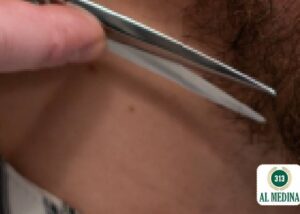Quran
Hadith
Islamic Text
بِسْمِ اللَّهِ الرَّحْمَنِ الرَّحِيمِ
In the Name of Allah Most Merciful Most Kind
Short Answer
No, it is not Haram to trim the beard. Rather, it is Haram to remove it completely. Therefore, trimming a beard is permitted. However, it is best to keep a fist-length beard.
Hadith in Tirmidhi
حَدَّثَنَا مَرْوَانُ يَعْنِي ابْنَ سَالِمٍ الْمُقَفَّعَ، قَالَ: رَأَيْتُ ابْنَ عُمَرَ يَقْبِضُ عَلَى لِحْيَتِهِ، فَيَقْطَعُ مَا زَادَ عَلَى الْكَفِّ
Marwan ibn Salim al-Muqaffa’ said, I saw Ibn Umar (May Allah Most High be pleased with them both) take hold of his beard and cut that which exceeded a handful. (Sunan Abi Dawood 2357, Hasan).
In the authentic Hadith above, we find the great Sahabi Abdullah ibn Umar (May Allah Most High be pleased with them both) cutting his beard. As such, this is one of the main proofs used by Hanafi scholars when they mention the permissibility of trimming the beard.
Other Hadith Narrations
قَالَ: حَدَّثَنَا يُوسُفُ عَنْ أَبِيهِ عَنْ أَبِي حَنِيفَةَ، عَنِ الْهَيْثَمِ، عَنْ أَبِي قُحَافَةَ رَضِيَ اللَّهُ عَنْهُ أَنَّهُ أُتِيَ بِهِ النَّبِيَّ صَلَّى اللهُ عَلَيْهِ وَسَلَّمَ وَلِحْيَتُهُ قَدِ انْتَشَرَتْ فَقَالَ: «لَوْ أَخَذْتُمْ» وَأَشَارَ بِيَدِهِ إِلَى نَوَاحِي لِحْيَتِهِ
Abu Hanifah narrated from al-Haytham that Abu Quhafah (May Allah Most High be pleased with him) was brought to the Prophet ﷺ and his beard was dishevelled. He ﷺ said, ‘If only you would cut it.’ He ﷺ indicated with his hand, pointing to the edges of his beard. (Al-Aathaar of Imam Abu Yusuf, 1038).
The above narration is also found in Musnad Abi Hanifah (1233). These hadith are lesser-known works of Riwayah (narration). Therefore, it is more common to quote the Hadith of Sayidina Ibn Umar from Sunan Abi Dawood as mentioned previously.
Trimming the beard is recommended
فالتقدير: لو أخذتم نواحي لحيته طولاً وعرضاً، وتركتم قدر المستحب، وهو مقدار القبضة، وهي الحد المتوسط بين الطرفين المذمومين من إرسالهما مطلقاً، ومن حلقها وقصها على وجه استئصالها، وفي حديث الترمذي، عن ابن عمر، أنه عليه الصلاة والسلام كان يأخذ من لحيته، من عرضها وطولها. (شرح مسند أبي حنيفة)
The meaning is, trim from the edges of the beard – length and breadthwise – and leave the recommended amount which is a fist-length. This is moderation between the two blameworthy extremes. Namely, lengthening, without trimming and shaving, or, cutting to the extent of eradication. In the narration of al-Tirmidhi, it is narrated from (Sayidina) Ibn Umar that he (the Prophet) peace be upon him used to trim his beard length and breadthwise. (Imam Ali al-Qaari, Sharh Musnad Abi Hanifah).
A fist-length beard is Mustahab (Recommended)
In the Nass (text) above, Imam Ali al-Qari comments on the Hadith narration of Abu Quhafah. He explains that there was an encouragement to trim the beard. Further, he also explains that a beard should not be too long, nor too short. Additionally, he clarified that the recommended (Mustahab) length of a beard is a fist-length.
As well as proving that trimming the beard is recommended, the above comments by Imam Ali al-Qari also clarify that it is not obligatory to lengthen the beard to a fist-length. Rather, this practice is recommended.
Despite this, many Hanafis consider a fist-length beard to be Wajib (obligatory). Further, some Hanafis even consider people with shorter beards to be Fasiq (sinners) and refuse to pray behind them. However, these positions are an incorrect representation of the Hanafi Madhab.
Shaving clean is prohibited
The Hanafi Madhab deems shaving clean to be prohibited. Despite that, the Hanafi madhab also advises against a long unkept beard. As such, Islam always guides to moderation.
قَالَ النَّخَعِيُّ: عَجِبْتُ لِرَجُلٍ عَاقِلٍ طَوِيلِ اللِّحْيَةِ كَيْفَ لَا يَأْخُذُ مِنْ لِحْيَتِهِ فَيَجْعَلُهَا بَيْنَ لِحْيَتَيْنِ أَيْ طَوِيلٍ وَقَصِيرٍ، فَإِنَّ التَّوَسُّطَ مِنْ كُلِّ شَيْءٍ أَحْسَنُ. (مرقاة المفاتيح شرح مشكاة المصابيح)
(Imam) al-Nakhai said: I am astonished by an intelligent man with a long beard. Why does he not trim it and render it between two beards. Meaning long and short. Moderation in everything is most virtuous. (Imam Ali al-Qari, Mirqaat al-Mafateeh).
And Allah Most High Knows Best.
–Answered by Shaykh Noorud-deen Rashid (18.07.23)






